三级考试主要句型
- 格式:doc
- 大小:29.00 KB
- 文档页数:5
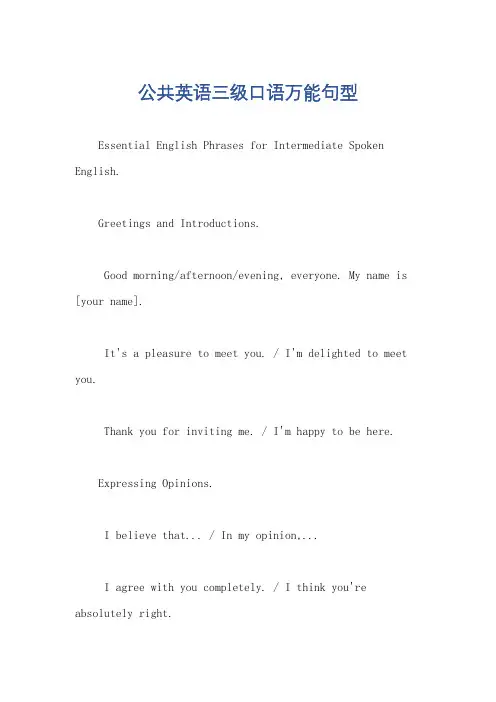
公共英语三级口语万能句型Essential English Phrases for Intermediate Spoken English.Greetings and Introductions.Good morning/afternoon/evening, everyone. My name is [your name].It's a pleasure to meet you. / I'm delighted to meet you.Thank you for inviting me. / I'm happy to be here.Expressing Opinions.I believe that... / In my opinion,...I agree with you completely. / I think you're absolutely right.I'm not sure I agree with you. / I see your point, but...I understand your point, but I still disagree.Asking and Answering Questions.Can you repeat that, please?Could you explain that again?What do you think about the matter?How do you feel about it?Giving Reasons and Explanations.The reason I say this is because...The reason for my disagreement is...This is because... / This is the reason why... I'm saying this because...Making Suggestions.Perhaps we could do it this way.What if we try this?What do you suggest we do?How about we make a decision?Expressing Agreement or Disagreement.I completely agree. / I couldn't agree more. I agree to some extent.I disagree with you. / I don't agree with you.I strongly disagree.Expressing Agreement with Reservations.I agree with you, but...I understand your point, but...I see your perspective, but...Expressing Uncertainty or Doubt.I'm not sure.I don't know.I'm not certain.I'm not convinced.Other Useful Phrases.Can you help me with...I'm sorry to interrupt.I'd like to add something.I have a question.Let's move on to the next topic.Thank you for your time. / Thank you for listening. Additional Tips for Fluency.Use connecting words and phrases:for example,。
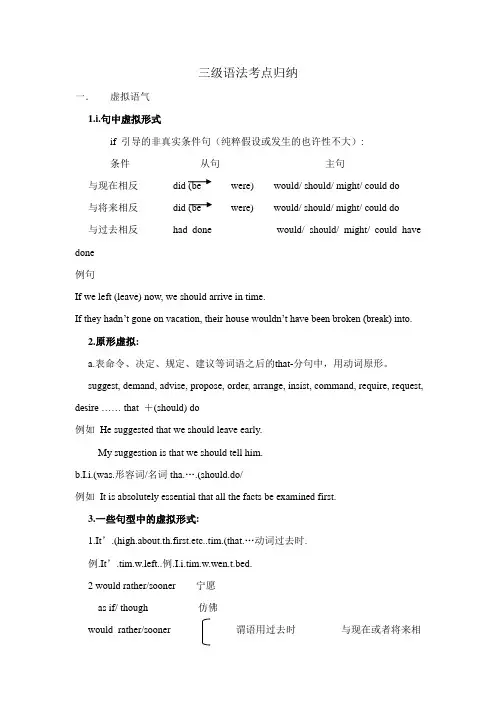
三级语法考点归纳一.虚拟语气1.i.句中虚拟形式if 引导的非真实条件句(纯粹假设或发生的也许性不大):条件从句主句与现在相反did (be were) would/ should/ might/ could do与将来相反did (be were) would/ should/ might/ could do与过去相反had done would/ should/ might/ could have done例句If we left (leave) now, we should arrive in time.If they hadn’t gone on vacation, their house wouldn’t have been broken (break) into.2.原形虚拟:a.表命令、决定、规定、建议等词语之后的that-分句中,用动词原形。
suggest, demand, advise, propose, order, arrange, insist, command, require, request, desire …… that +(should) do例如He suggested that we should leave early.My suggestion is that we should tell him.b.I.i.(was.形容词/名词tha.….(should.do/例如It is absolutely essential that all the facts be examined first.3.一些句型中的虚拟形式:1.It’.(high.about.th.first.etc..tim.(that.…动词过去时.例.It’.tim.w.left..例.I.i.tim.w.wen.t.bed.2 would rather/sooner 宁愿as if/ though 仿佛would rather/sooner 谓语用过去时与现在或者将来相反as if/ though 谓语用过去完毕时与过去相反4.练习1..______.tr.i.agai.i.I_______you.A.will.a......B.should.a....C.would.wer...D.would.ha.been2.I.i.______.no.fo.th.water.th.plant._______live.A.were.woul.no..B.is.coul.no...C.were.coul...D.did.coul.not3.I.. ______.tha.chanc.t.sho.m.ability.._______th.presiden.o.thi.school.A.hav.no.had.coul.no.become ..B.ha.no.had.woul.no.hav.becom.C.di.no.have.coul.no.become ..D.doesn’.have.wil.no.become4.H.______.b.tha.burgla.i.yo.______.t.sav.him.A.migh.hav.bee.killed.hadn’.com...B.wil.b.killed.didn’.comeC.ma.b.killed.did’.com.......D.coul.b.killed.haven’.come5.I.i._______fo.you.help.._______tha.har.tim.wit.s.littl.money.A.wer.not.woul.no.spen........B.i.not.ca.no.spendC.ha.no.been.woul.no.hav.spen....D.hav.no.been.wil.no.spend6.Wher.______.yo.g.i.wa._______?A.will.break.ou............B.do.wil.brea.outC.would.wer.t.brea.ou........D.will.i.t.brea.out7.Sh.wishe.sh.______.tha.humiliatin.thing.A.doesn’.d....B.didn’.d.....C.haven’.don..D.hadn’.done8.Th.chairma.suggeste.tha.th.meetin.______.pu.off.A.ca.b.....B.b......C.i.......D.wil.be9.I.i.vita.tha.h.______.immediately.A.shoul.g...B.mus.g....C.goe......D.wen.10.I.i.tim.w._______d.ou.homework.A.begi.t....B.ca.begi.t..C.bega.t....D.wil.begi.to答案:1.选C。

成人英语三级考试英语语法常考句型(必背)成人英语三级考试:英语语法常考句型(1)主语+不及物动词+现在分词/过去分词说明:1.本句型中的谓语动词由不及物动词充当,分词作状语。
2.现在分词短语作状语时通常表示主语正在进行的另一个动作,起陪衬或修饰作用。
3.过去分词(短语)作状语时,主要修饰谓语动词,表示动作发生的背景与情况。
4.现在分词/过去分词(短语)作状语时,其逻辑主语与句子是一致的。
例:a)They sat facing each other.他们面对面地坐着。
b)He lay on the grass enjoying the sunshine.他躺在草地上享受阳光。
c)Frustrated, he went back to his home village.他大失所望,回到家乡去。
d)Supported by the people, our troops struck back with guns and grenades.在人民的支持下,我军以步枪和手榴弹进行了反击。
(2)主语+及物动词+动词不定式说明:1.本句型中宾语由动词不定式充当。
2.本句型中的动词不定式可用被动式和完成式。
3.本句型中的动词不定式可在to前加not或never表示否定。
4.可接动词不定式作宾语的动词主要有:expect, hope, want, wish,apply, ask, manage, arrage, prepare, agree, promise, trouble, hilp,decline, choose, fail等。
例:a)He would admire to be a pilot.他喜欢当飞行员。
b)The scientist claims to have discovered a new planet.这位科学家宣称发现了一颗新的行星。
c)They pretended not to see us.他们佯装没有看见我们。
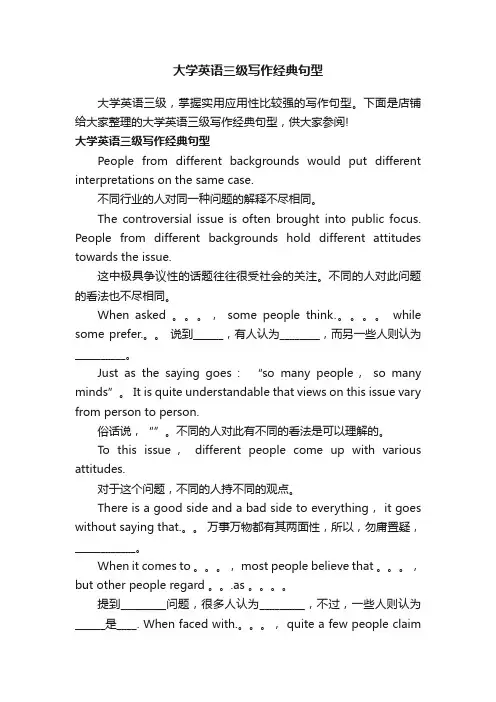
大学英语三级写作经典句型大学英语三级,掌握实用应用性比较强的写作句型。
下面是店铺给大家整理的大学英语三级写作经典句型,供大家参阅!大学英语三级写作经典句型People from different backgrounds would put different interpretations on the same case.不同行业的人对同一种问题的解释不尽相同。
The controversial issue is often brought into public focus. People from different backgrounds hold different attitudes towards the issue.这中极具争议性的话题往往很受社会的关注。
不同的人对此问题的看法也不尽相同。
When asked 。
,some people think.。
while some prefer.。
说到______,有人认为________,而另一些人则认为__________。
Just as the saying goes:“so many people,so many minds”。
It is quite understandable that views on this issue vary from person to person.俗话说,“”。
不同的人对此有不同的看法是可以理解的。
To this issue,different people come up with various attitudes.对于这个问题,不同的人持不同的观点。
There is a good side and a bad side to everything, it goes without saying that.。
万事万物都有其两面性,所以,勿庸置疑,____________。
When it comes to 。
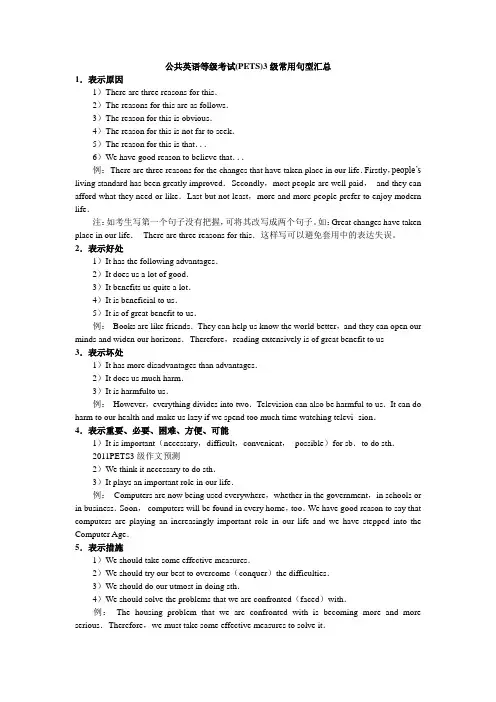
公共英语等级考试(PETS)3级常用句型汇总1.表示原因1)There are three reasons for this.2)The reasons for this are as follows.3)The reason for this is obvious.4)The reason for this is not far to seek.5)The reason for this is that...6)We have good reason to believe that...例:There are three reasons for the changes that have taken place in our life.Firstly,people’s living standard has been greatly improved.Secondly,most people are well paid,and they can afford what they need or like.Last but not least,more and more people prefer to enjoy modern life.注:如考生写第一个句子没有把握,可将其改写成两个句子。
如:Great changes have taken place in our life.There are three reasons for this.这样写可以避免套用中的表达失误。
2.表示好处1)It has the following advantages.2)It does us a lot of good.3)It benefits us quite a lot.4)It is beneficial to us.5)It is of great benefit to us.例:Books are like friends.They can help us know the world better,and they can open our minds and widen our horizons.Therefore,reading extensively is of great benefit to us3.表示坏处1)It has more disadvantages than advantages.2)It does us much harm.3)It is harmfulto us.例:However,everything divides into two.Television can also be harmful to us.It can do harm to our health and make us lazy if we spend too much time watching televi- sion.4.表示重要、必要、困难、方便、可能1)It is important(necessary,difficult,convenient,possible)for sb.to do sth.2011PETS3级作文预测2)We think it necessary to do sth.3)It plays an important role in our life.例:Computers are now being used everywhere,whether in the government,in schools or in business.Soon,computers will be found in every home,too.We have good reason to say that computers are playing an increasingly important role in our life and we have stepped into the Computer Age.5.表示措施1)We should take some effective measures.2)We should try our best to overcome(conquer)the difficulties.3)We should do our utmost in doing sth.4)We should solve the problems that we are confronted(faced)with.例:The housing problem that we are confronted with is becoming more and more serious.Therefore,we must take some effective measures to solve it.6.表示变化1)Some changes have taken place in the past five years.2)A great change will certainly be produced in the world's communications.3)The computer has brought about(导致)many changes in education.例:Some changes have taken place in people's diet in the past five years.The major reasons for these changes are not far to seek.Nowadays,more and more people are switching from grain to meat for protein,and from fruit and vegetable to milk for vitamins7.表示事实、现状1)We cannot ignore the fact that...2)No one can deny the fact that...3)There is no denying the fact that...4)This is a phenomenon that many people are interested in.5)However,that's not the case.例:We cannot ignore the fact that industrialization brings with it the problems of pollution.To solve these problems,we can start by educating the public about the hazards(危害)of pollution.The government on its part should also design stricter laws to promote a cleaner environment8.表示比较1)Compared with A,B...2)I prefer to read rather than watch TV.3)There is a striking contrast between them.例:Compared with cars,bicycles have several advantages besides being affordable.Firstly,they do not consume natural resources of petrol(石油).Secondly,they do not cause the pollution problem.Last but not least,they contribute to people's health by giving them due physical exercise.9.表示数量1)It has increased(decreased)from...to...2)The population in this city has now increased (decreased)to 800,000.3)The output of July in this factory increased by 15%compared with that of January.例:With the improvement of the living standard,the proportion(比例)of people's income spent on food has decreased while that spent on education has increased.再如:From the graph listed above,itcan be seen that student use of computers has increased from an average of less than two hours per week in 1990 to 20 hours in 2000.注:"From the graph listed above,it can be seen that"见句式12。
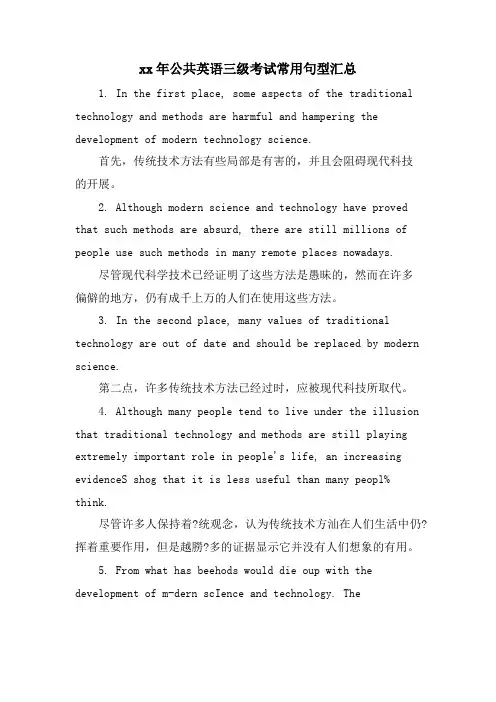
xx年公共英语三级考试常用句型汇总1. In the first place, some aspects of the traditional technology and methods are harmful and hampering the development of modern technology science.首先,传统技术方法有些局部是有害的,并且会阻碍现代科技的开展。
2. Although modern science and technology have proved that such methods are absurd, there are still millions of people use such methods in many remote places nowadays.尽管现代科学技术已经证明了这些方法是愚昧的,然而在许多偏僻的地方,仍有成千上万的人们在使用这些方法。
3. In the second place, many values of traditional technology are out of date and should be replaced by modern science.第二点,许多传统技术方法已经过时,应被现代科技所取代。
4. Although many people tend to live under the illusion that traditional technology and methods are still playing extremely important role in people's life, an increasing evidenceS shog that it is less useful than many peopl% think.尽管许多人保持着?统观念,认为传统技术方汕在人们生活中仍?挥着重要作用,但是越朥?多的证据显示它并没有人们想象的有用。
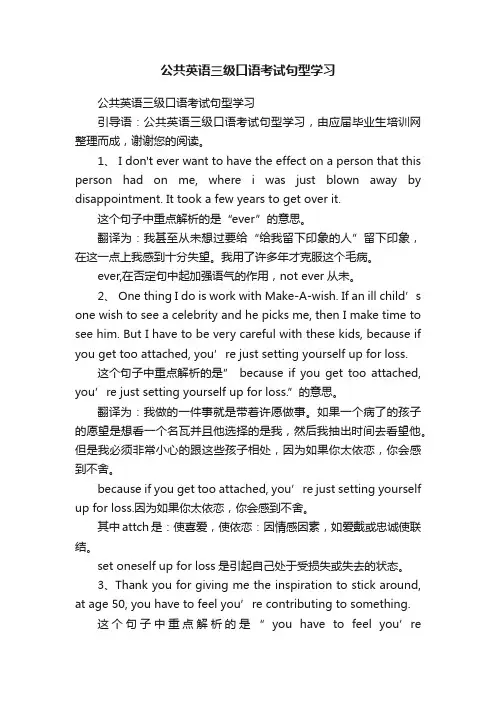
公共英语三级口语考试句型学习公共英语三级口语考试句型学习引导语:公共英语三级口语考试句型学习,由应届毕业生培训网整理而成,谢谢您的阅读。
1、 I don't ever want to have the effect on a person that this person had on me, where i was just blown away by disappointment. It took a few years to get over it.这个句子中重点解析的是“ever”的意思。
翻译为:我甚至从未想过要给“给我留下印象的人”留下印象,在这一点上我感到十分失望。
我用了许多年才克服这个毛病。
ever,在否定句中起加强语气的作用,not ever从未。
2、 One thing I do is work with Make-A-wish. If an ill child’s one wish to see a celebrity and he picks me, then I make time to see him. But I have to be very careful with these kids, because if you get too attached, you’re just setting yourse lf up for loss.这个句子中重点解析的是” because if you get too attached, you’re just setting yourself up for loss.”的意思。
翻译为:我做的一件事就是带着许愿做事。
如果一个病了的孩子的愿望是想看一个名瓦并且他选择的是我,然后我抽出时间去看望他。
但是我必须非常小心的跟这些孩子相处,因为如果你太依恋,你会感到不舍。
because if you get too attached, you’re just setting yourself up for loss.因为如果你太依恋,你会感到不舍。
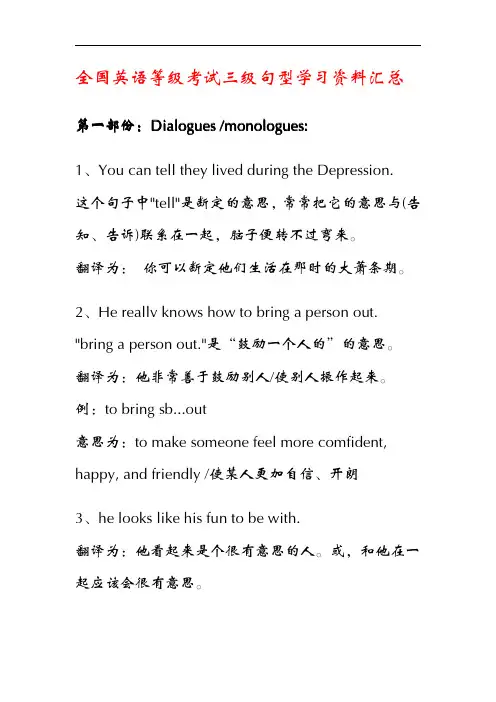
全国英语等级考试三级句型学习资料汇总Dialogues/monologues:第一部份:第一部份:Dialogues1、You can tell they lived during the Depression.这个句子中"tell"是断定的意思,常常把它的意思与(告知、告诉)联系在一起,脑子便转不过弯来。
翻译为:你可以断定他们生活在那时的大萧条期。
2、He reallv knows how to bring a person out. "bring a person out."是“鼓励一个人的”的意思。
翻译为:他非常善于鼓励别人/使别人振作起来。
例:to bring sb...out意思为:to make someone feel more comfident, happy,and friendly/使某人更加自信、开朗3、he looks like his fun to be with.翻译为:他看起来是个很有意思的人。
或,和他在一起应该会很有意思。
4、since we're going to recruit some staff so that we can get our new school going in time。
这里的since,和so that是基于...原因的意思.根据意思我将其译成:届时...将...以便...翻译为:届时我们将聘请一些工作人员以便使我们的新学校及时开学.5、Would you address character description for the commercial and industrial arts staff?翻译为:你能够给商业与工艺美术的职员讲讲特征描述吗?arts跟前面的commercial and indutrial连在一起看,而非与后面的staff:(the commercial and industrial arts) staff.6、There are a number of other positions to consider. "A number of"换成"a lot of"或者是”a great many”行不行,为什么?可以换成a lot of或a great many of,因为position是可数名词。
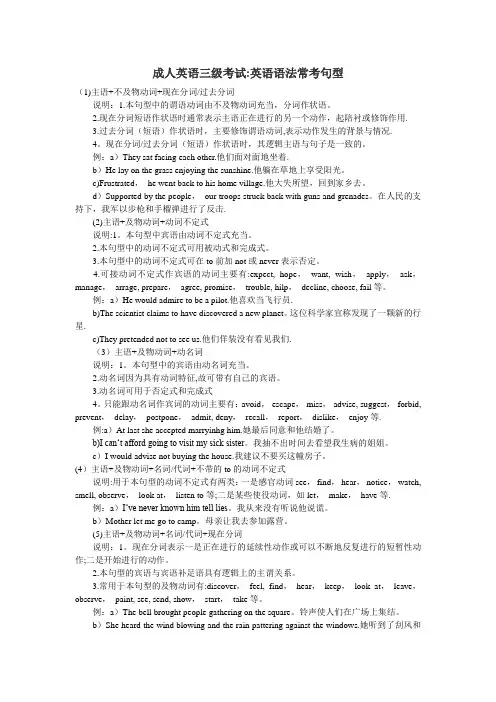
成人英语三级考试:英语语法常考句型(1)主语+不及物动词+现在分词/过去分词说明:1.本句型中的谓语动词由不及物动词充当,分词作状语。
2.现在分词短语作状语时通常表示主语正在进行的另一个动作,起陪衬或修饰作用.3.过去分词(短语)作状语时,主要修饰谓语动词,表示动作发生的背景与情况.4。
现在分词/过去分词(短语)作状语时,其逻辑主语与句子是一致的。
例:a)They sat facing each other.他们面对面地坐着.b)He lay on the grass enjoying the sunshine.他躺在草地上享受阳光。
c)Frustrated,he went back to his home village.他大失所望,回到家乡去。
d)Supported by the people,our troops struck back with guns and grenades。
在人民的支持下,我军以步枪和手榴弹进行了反击.(2)主语+及物动词+动词不定式说明:1。
本句型中宾语由动词不定式充当。
2.本句型中的动词不定式可用被动式和完成式。
3.本句型中的动词不定式可在to前加not或never表示否定。
4.可接动词不定式作宾语的动词主要有:expect, hope,want, wish,apply,ask,manage,arrage, prepare,agree, promise,trouble, hilp,decline, choose, fail等。
例:a)He would admire to be a pilot.他喜欢当飞行员.b)The scientist claims to have discovered a new planet。
这位科学家宣称发现了一颗新的行星.c)They pretended not to see us.他们佯装没有看见我们.(3)主语+及物动词+动名词说明:1。
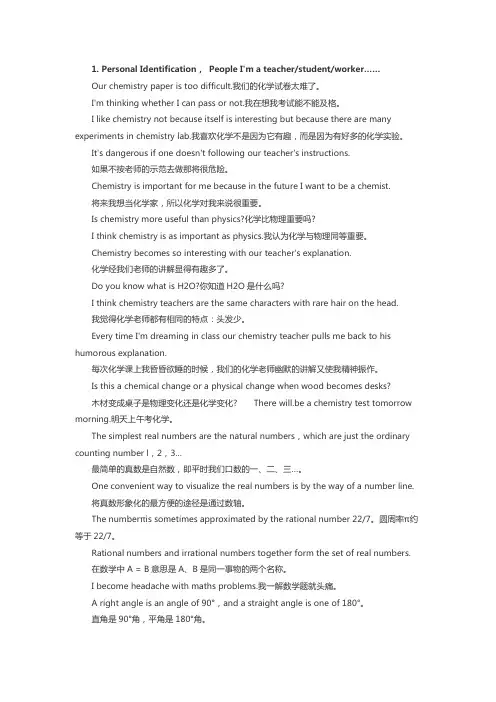
1. Personal Identification,People I'm a teacher/student/worker……Our chemistry paper is too difficult.我们的化学试卷太难了。
I'm thinking whether I can pass or not.我在想我考试能不能及格。
I like chemistry not because itself is interesting but because there are many experiments in chemistry lab.我喜欢化学不是因为它有趣,而是因为有好多的化学实验。
It's dangerous if one doesn't following our teacher's instructions.如果不按老师的示范去做那将很危险。
Chemistry is important for me because in the future I want to be a chemist.将来我想当化学家,所以化学对我来说很重要。
Is chemistry more useful than physics?化学比物理重要吗?I think chemistry is as important as physics.我认为化学与物理同等重要。
Chemistry becomes so interesting with our teacher's explanation.化学经我们老师的讲解显得有趣多了。
Do you know what is H2O?你知道H2O是什么吗?I think chemistry teachers are the same characters with rare hair on the head.我觉得化学老师都有相同的特点:头发少。
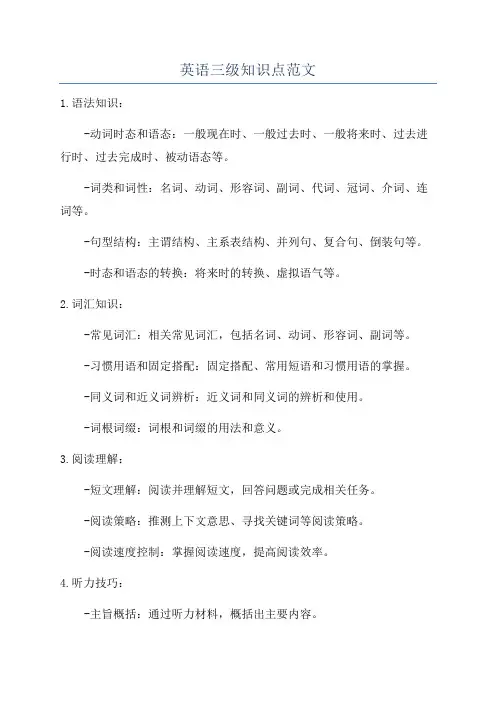
英语三级知识点范文
1.语法知识:
-动词时态和语态:一般现在时、一般过去时、一般将来时、过去进行时、过去完成时、被动语态等。
-词类和词性:名词、动词、形容词、副词、代词、冠词、介词、连词等。
-句型结构:主谓结构、主系表结构、并列句、复合句、倒装句等。
-时态和语态的转换:将来时的转换、虚拟语气等。
2.词汇知识:
-常见词汇:相关常见词汇,包括名词、动词、形容词、副词等。
-习惯用语和固定搭配:固定搭配、常用短语和习惯用语的掌握。
-同义词和近义词辨析:近义词和同义词的辨析和使用。
-词根词缀:词根和词缀的用法和意义。
3.阅读理解:
-短文理解:阅读并理解短文,回答问题或完成相关任务。
-阅读策略:推测上下文意思、寻找关键词等阅读策略。
-阅读速度控制:掌握阅读速度,提高阅读效率。
4.听力技巧:
-主旨概括:通过听力材料,概括出主要内容。
-细节理解:听取细节信息,回答相关问题。
-对话场景判断:根据对话内容,判断场景和人物关系。
-短文完形填空:根据短文内容,选择正确的选项。
5.口语表达:
-日常交际用语:问候、介绍自己、提出请求、道歉、感谢、邀请等常见交际用语。
-自我介绍:掌握简单自我介绍的表达方式。
-问答对话:回答与问题相匹配的内容,进行对话交流。
-完成任务:按要求进行任务表达,如描述图片、演讲等。
6.写作技巧:
-信件写作:写推荐信、道歉信、感谢信、邀请信等。
-短文写作:写文章、记叙文、说明文等。
-日记写作:根据给定的时间和话题,进行日记写作。
剑桥少儿英语3级主要句型1. 祈使句祈使句用来表达请求、命令或建议,常以动词原形作为谓语,主语通常省略。
例如:•Sit down. (坐下)•Don’t run. (不要跑)•Have a nice day. (祝你好心情)在口语交际中,祈使句使用非常频繁,学习祈使句是非常重要的。
2. 询问句询问句用来询问信息或寻求答案。
一般情况下,询问句以特定的疑问词开头,例如:what、when、where、who、which和how。
例如:•What time is it now? (现在几点了?)•Where do you live? (你住在哪里?)•How do you spell your name? (你的名字怎么拼写?)注意,在英语中,询问句的语序通常为主语+谓语+疑问词+其他。
3. 状态句状态句主要用来表达状态或特定情况。
一般情况下,状态句包含一个主语和一个谓语,谓语通常是系动词。
例如:•He is happy. (他很开心)•The lake is frozen. (湖面结冰了)•She seems sad. (她看上去很悲伤)除了系动词外,还有一些常用的动词可以用于状态句,例如:feel、look、smell、taste等。
4. 肯定句肯定句通常用来表达肯定或正面的意思。
一般情况下,肯定句包含一个主语和一个谓语,谓语可以是由be动词构成的,也可以是其他动词。
例如:•I am a student. (我是一名学生)•She sings very well. (她唱歌很好听)•They have a lot of friends. (他们有很多朋友)需要注意的是,肯定句需要使用正确的时态和语态。
5. 否定句否定句通常用来表达否定或负面的意思。
一般情况下,否定句由否定词(not)和谓语构成,谓语可以是由be动词构成的,也可以是其他动词。
例如:•I am not a teacher. (我不是一名老师)•She does not like coffee. (她不喜欢咖啡)•They have not finished their homework yet. (他们还没有完成作业)需要注意的是,否定句中的否定词(not)放在be动词之后、其他动词之前。
大学英语三级考试语法总结大学英语三级考试对于许多非英语专业的同学来说是一个重要的阶段性检测。
语法作为英语学习的重要组成部分,掌握好它对于提升考试成绩、增强英语实际运用能力都有着关键作用。
以下是对大学英语三级考试中常见语法点的总结。
一、时态时态是英语语法中非常重要的一部分,在考试中经常出现。
1、一般现在时:表示经常发生的动作、客观事实或真理。
例如:“The earth revolves s around the sun”(地球绕着太阳转。
)其结构为:主语+动词原形(当主语为第三人称单数时,动词要加 s 或 es)。
2、一般过去时:表示过去发生的动作或存在的状态。
比如:“I played basketball yesterday”(我昨天打篮球了。
)其结构为:主语+动词的过去式。
3、一般将来时:表示将来要发生的动作或存在的状态。
常见表达有:“will +动词原形”或“be going to +动词原形”。
例如:“I will go to Beijing next week”(我下周将去北京。
)4、现在进行时:表示正在进行的动作。
结构为:主语+ am/is/are +动词的现在分词。
例如:“She is reading a book now”(她现在正在读书。
)5、过去进行时:表示过去某个时刻正在进行的动作。
其结构为:主语+ was/were +动词的现在分词。
如:“I was watching TV at eighto'clock last night”(昨晚八点我正在看电视。
)6、现在完成时:表示过去发生的动作对现在造成的影响或结果,或者过去开始一直持续到现在的动作。
结构为:主语+ have/has +过去分词。
比如:“I have finished my homework”(我已经完成了作业。
)7、过去完成时:表示过去某个时间之前已经完成的动作。
结构为:主语+ had +过去分词。
例如:“By the end of last year, we had learned 2000 words”(到去年年底,我们已经学了 2000 个单词。
日语三级考试句型,考点一览序号分类句型例句1 代名詞コ・ソ・ア・ド体系「きのう、田中さんという人に会いました。
」「その人、おもしろいですか。
」2 形式名詞~の時/…時家を出るときに、電話がなりました。
3 形式名詞…方使い方、食べ方4 形式名詞…ために(原因)急に雨が降ったため、試合は中止になりました。
5 形式名詞…はずだ王さんはいま、まだ図書館にいるはずです。
6 形式名詞…つもりだ来年、日本へ留学するつもりです。
7 形式名詞…ところだ「お昼はもう食べましたか。
」「ちょうど食べるところです。
」8 形式名詞…ているところだ「もしもし、山田さんはいますか。
」「すみません、いまお風呂に入っているところです。
」9 形式名詞…(た)ところだ会社から帰ってきたところです。
10 形式名詞…のが見える/聞こえる鳥が鳴いているのが聞こえます。
11 形式名詞…のを見る/聞く飛行機が飛んでいったのを見ました。
12 形式名詞…のに論文を書くのに3ヶ月かかりました。
13 形式名詞~の(ん)だ遅れて、すみません。
電車が事故で止まったのです。
14 形式名詞…まま靴をはいたまま、部屋に入らないでください。
15 助数詞~め三回目16 補助動詞…がるうれしがる、ほしがる、読みたがる17 補助動詞…すぎる冷たいジュースを飲みすぎたので、おなかをこわしました。
18 補助動詞…はじめる風が吹き始めましたた。
19 補助動詞…おわるこの本はもう読みおわりました。
20 補助動詞…つづける風は吹きつづけています。
21 補助動詞…やすいこのカメラはとても使いやすいです。
22 補助動詞…にくい日本語の単語はたいへん覚えにくいです。
23 補助動詞…てある机の上に辞書が置いてあります。
24 補助動詞…ておくお客さんが来るために、おかしを買っておきました。
25 補助動詞…ていく飛行機が遠くへ飛んでいきました。
26 補助動詞…てくる気をつけろ!ボールが飛んできたよ!27 補助動詞…てしまう宿題を忘れてしました。
公共英语三级p e t s口语考试重点句型Standardization of sany group #QS8QHH-HHGX8Q8-GNHHJ8-HHMHGN#公共英语(pets3)三级口语考试重点句型English1)常用句子Do you speak English?你会讲英语吗?Yes, a little.是的,会一点儿。
My native language is Chinese.我的本族语是汉语。
How many languages do you speak?你会讲几种语言?My friend speaks,reads and writes several languages.我的朋友会说、读、写几种语言。
I have a lot of trouble with pronunciation.我发音有很多困难。
He speaks French with an American accent.他讲法语带有美国口音。
My parents speak Spanish fluently.我的父母西班牙语说得很流利。
His English is perfect.他的英语棒极了。
Very often I make mistakes in grammar when I speak English.我老是在讲英语时犯语法错误。
His mother tongue is Portuguese.他的母语是葡萄牙语。
Once in a while I make mistakes in spelling.我偶尔出一些拼写错误。
He speaks Japanese extremely well.他日语讲得好极了。
Do you know how to speak Russian?你知道怎样讲俄语吗?Martha knows Italian well.玛莎意大利语很好。
2)常用对话Mr. Green; Do you speak Japanese, Mrs. Brown?Mrs. Brown: Yes I do. I speak a little Japanese.Mr. Green: Does your husband speak Japanese, too?Mrs. Brown; Yes, a little. He speaks a little Japanese.Mr. Green: How well do you know French?Mrs. Brown: Pretty well. But I have a lot of trouble with spelling.Mr. Green: How many languages do you speak?Mrs. Brown: I speak four languages. How many do you sepak?Mr. Green: I speak three languages. I don't speak Japanese.Mrs. Brown: What language do you speak?Mr. Green: I speak French, Greek, Arabic and English.Mrs. Brown: Do you read and write those languages?Mr. Green: Yes, I do. But sometimes I make mistakes in spelling.Mrs. Brown: So do I.3)常用短文The English LanguageEnglish is the principal language of the United States, Canada, United Kingdom, Ireland, Australia, New Zealand, Bahamas, Jamaica, Barbodos, Grenada, Trinidad and Tobago, and Guyana; the official language of over a dozen African countries, and other areas such as Belize, Hong Kong, and Gibraltar, and numerous islands in million, so the language has been referredto as the "unofficial international language".There are three recognized periods in the history of English: Old English, from earliest time to 1150 A. D.; Middle English, 1150-1500; and Modern English, 1500 to the present. English reigned in England only in the late 14th century, with London dialect as the standard. As late as in 1700, there were only 8. 5 million English speakers. As a result of vastcolonial expansion, the number shot up to 123 million by 1900, and has since tripled.English is structurally closer to Chinese than to any ofits European cousins. Parts of speech are ofter fuzzy; the word "up" can be an adverb, preposition, verb, noun, or adjective. Word order is stereotyped; there is a big difference in meaning between "look over" and "overlook" or "stand with" and "withstand". Seven different meanings can be put into the following sentence by successively insertingThe complete English vocabulary consists of almost 1 million words, yet 3,000 words make up 95% of all utterance. English accounts for 3/4 of the world's mail, 1/2 of the newspapers, and 3/5 of all radio stations.Job1)常用句子I'm looking for a there any vacancies?我在找工作,有空缺吗?I'm badly in need of it possible to find one here?我极需就业,这儿有可能找到工作吗?Are there any positions vacant in your firm?贵公司有职位空缺吗?Can you fix me up with a secretarial job?你能不能给我安排一个秘书工作?I'd like to know if you need any temporary interpreter.不知你们有没有临时口译的空缺。
1.That's the "tremendous business" for me out of the three meals a day, for, except for the weekends,we have only this meal together. Besides, he always has his lunch in a neglected way at his workplace.翻译为:那对于我来说,是除了三顿饭以外,最为重大的事情。
因为,除了周末,我们只能在一起吃一顿正餐。
此外,他总是在他的工作场所,很轻率的打发他的午餐。
2.clearer skies and much light winds allowed temperatures to drop well into single figures resulting in a touch of grand frost in some rural areas.翻译为:清凉的天空和微风让温度值降到了个位数,使得很多乡村地区出现了霜.3.You're on your own.注意的词语:on one's own:独立地、独自地。
翻译为:你自己玩吧!4.I'm in a hurry.翻译为:我得赶紧。
注意的词语:"in a hurry"指匆忙,有时用作口语也表示轻易地做好某件事情。
5.Karen has just had her house redecorated.翻译为:凯瑞刚让人把房子重新装修。
注意这里的用法,had sth done - 强调的是让别人做了什么例:I had my clothes washed.(我让人把衣服洗了)6.Merely requesting a reservation can be as difficult as getting one.翻译为:哪怕是仅仅要求预定(房间)都有可能象真要得到它一样那么难。
三级考试主要句型
1.お+动词连用形+になる/构成尊敬语,表示对方的行为动作
2.お+动词连用形+くださる/构成尊敬语,表示对方的行为动作
3.お+动词连用形+する(いたす)/构成自谦语
4.(动词连体形)+つもりです/打算……
5.(动词推量形)う(よう)と思う/我想……
6.(名词)にする/表示选择、决定的结果
7.(动词否定形)ないで(或ずに)/不…就…;没有…就…
例子:兄は今日、鞄を持たずにいえをでました。
哥哥没有带书包就出去了
8.(动词否定形)なければなりません(なければならない)/必须……;一定要……9.(动词连用形)+ていく/表示由近及远的行为或状态。
……去;……下去;……过去10.(动词连用形)+てくる/表示由远及近的行为或状态。
……来;……起来;…过来11.(动词连用形)+てみる/表示试探性地做某事
12.(动词连用形)+てしまう/表示完了、不能恢复原状或与愿望相反的结果等。
13.(动词连用形)+ておく/表示事先作好某种动作或保持某种状态。
14.(动词连用形)+てやる、あげる、差し上げる/表示给第一人称以外的其他人称做某种事情。
15.(动词连用形)+てくれる、くださる/表示给第一人称做某事情,第一人称是受益者。
16.(动词连用形)+てもらう、ていただく/表示说话人请他人为自己作某事,自己是受益者。
17.(动词连用形)+はじめる/开始……
18.(动词连用形)+だす/……起来
19.(动词连用形、形容词或形容动词词干)+すぎる/表示动作行为超过某限度。
相当于汉语的“过于……”
20.(动词连用形)+たい(です)(或たいと思う)/表示说话人自己的愿望
21.(动词连用形)+たがる/表示第三人称的愿望
22.(动词连用形)+てもいい(です)/表示许可,允许,相当于“可以……”;“……也可以”
23.(动词未然形)+なくてもいい(です)/表示许可,相当于汉语的“可以不……”;“不……也可以”
24.(动词未然形)+なくてはいけない/必须……;如果不……就不行
25.(动词连用形)+てもかまいません(或てもかまわない)/表示许可,允许。
相当于“…也没关系”
26.(动词连用形)+てはいけません(てはいけない)/表示禁止。
27.(动词、助动词连体形)+ことがある/有时……
28.(动词、助动词连体形)+こともある/有时也……
29.(动词、助动词连体形)+たことがある/曾经……过
30.(动词、助动词连体形)+たことがない/从未……过。
31.(动词连体形)+ことができる/能……;能够……;会……
32.(动词连用形)+つづける/表示动作行为的持续进行
33.(动词连用形)+おわる/表示动作的终了、完了
34.(名词、用言终止形、形容动词词干)+かもしれません(或かもしれない)表示“也许……”;“或许……”;“说不定……”等
35.(动词连用形)+やすい/容易……;不难……
36.(动词连用形)+にくい/不容易……;难以……
37.(动词连用形)+かた(方)/表示“…方法(作法)”
38.(动词连用形)+なさい/表示轻微的命令。
可译为“请……”
39.(用言终止形)+そうです/表示“据说……”;“听说……”,前面可与…によると、…によれば等相呼应。
40.(动词连用形、形容词、形容动词词干)+表示样态,相当于“看上去像……”;“好像……”
41.1)(意志动词终止形、体言+の)+ために/表示目的,“为了……”
2) 当ため(に)前面是非意志性表现时,表示原因,理由。
相当于“因为……”;“由于……”
42.(动词连体形)+ことにする/表示说话人按自己的主观意志做出的决定。
43.(动词连体形)+ことになる/表示客观产生的某种结果或事实。
44.(体言+の、用言连体形)+ようだ(ようです)/表示比况、比喻、推测等,“好像……那样”
45.(用言终止形)+から/表示原因、理由
46.(用言连体形)+ので/表示原因、理由
47.(疑问词)+か/表示不确定(不表示疑问)
48.(用言终止形)+かどうか/表示“是否……”;“是不是……”
49.(用言连体形)+ようにする/表示目的、要求、希望、请求等。
译成“做到……”,“像……那样去做”等。
50.(用言连体形)+ようになる/“ようになる”前面常常是可能表现,表示从一种
状态变化为另一种状态。
51.(动词连体形)+ところです/正要的……时候
52.(动词连用形)+ているところです/正在……的时候
53.(动词连用形)+たところです/刚刚……
54.いくら+(用言连用形)+ても/无论怎样……也;即使……也……
55.(体言)ほど…ありません(ない)/
1)…不像…那么…2)没有比…更…的
56.(动词未然形)+(さ)せてください/请让我……;请允许我……
57.(动词连用形)+た方がいい(です)/表示劝诱。
“最好……”“……为好”
58.(动词未然形)+ない方がいい(です)/表示劝诱、主张,“最好不……”
59.(体言)+より/1)表示比较的基准;
2) 表示起点,“自……”“从……”
60.(用言连体形)+はじです/“应该…;理所当然…”
61.(体言)+について/关于……,就……
62.(体言)+にとって/表示评价的基准,“对于……来说”
63.(体言)+から+(体言)にかけて/从……到……
64.(动词终止形)+べきだ/表示说话人的意见,主张,译成“应该……”“应当……“。
べきだ接サ变动词时有”…するべきだ“、”…すべきだ“两种形式。
例子:学生はよく勉強すべきです。
/学生应该好好学习。
65.(体言+の、动词连体形)+予定(よてい)です/预定…;打算…;计划…
66.(体言)も…ば、(体言)も…/既……又……;既……也……
67.(体言)も…し、(体言)も…/既……又……;既……也……
68.(体言)を(体言)という/把…叫做…;把…称为…
69.(体言、用言连体形)だけ/表示限定,“仅……”,“只……”
70.…しか…ない/表示限定,“仅……”,“只……”
71.(体言)によると(によれば)/根据……;据……
72.(用言连体形)のに/表示逆接关系,“虽然…却…”
73.少しも…ない/一点也不……,丝毫也不……
74.ちっとも…ない/同73,一点也不……,丝毫也不……
75.(体言,用言终止形)とか/表示列举事物或行为。
动作,译为“…啦…啦”等76.(动词未然形)+(さ)せられる/表示被迫做某事,不得已而做某事。